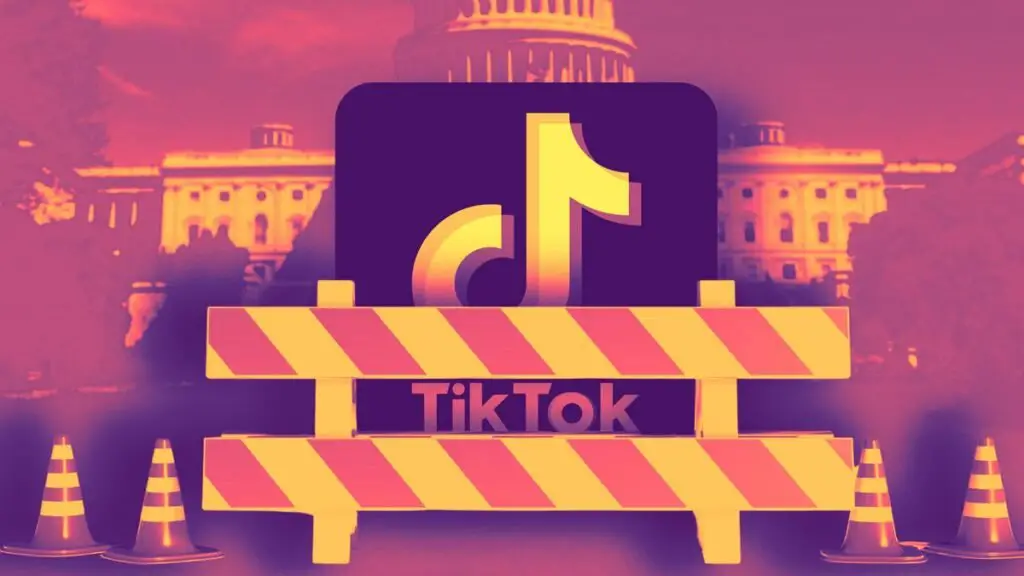Time for TikTok could be running out. Or maybe not yet.
A series of statements earlier in the weekend have made it uncertain what will happen to the popular Chinese social media platform on Sunday when a US ban is set to take effect. Possibilities include: It could “go dark.” It might only be dark for a day. Or at least it could keep going for a while.
Most recently, US President-elect Donald Trump, who is set to be sworn in on Monday, said on Saturday that he would likely grant TikTok a reprieve of several months. This followed conflicting statements from TikTok and the outgoing Biden administration, which had said it would leave enforcement of the ban to the new president.
TikTok said Friday evening that it would go “dark” on Sunday unless it received clear assurances from government officials that the ban would not be enforced. Statements from the White House and the Justice Department “did not provide the necessary clarity and certainty” to service providers required to make TikTok available in the United States, TikTok said in a statement on X.
“Unless the Biden Administration immediately issues a definitive statement to satisfy the most critical service providers and ensure non-enforcement, TikTok will unfortunately be forced to cease operations on January 19,” the company said.
However, on Saturday morning, the White House called TikTok’s comments a ploy. The company’s statement was “a trick,” White House press secretary Karine Jean-Pierre said in a statement to the media. “We see no reason for TikTok or any other company to take any action in the next few days before the Trump administration takes office on Monday.”
The White House had issued one opinion On Friday, he said Biden’s position on TikTok has not changed – he still believes TikTok should remain available to Americans, but under ownership that addresses the administration’s national security concerns. “Given the sheer fact of timing, this government recognizes that action to implement the law must simply be left to the next government,” the statement said. Jean-Pierre reiterated that position on Saturday, saying “TikTok and other companies should raise any concerns” with the incoming Trump administration.
On Saturday, Trump told NBC News stated that once he takes office, he will “most likely” delay the TikTok ban for 90 days. “If I decide to do this, I will probably announce it on Monday,” Trump told the medium. Such a postponement is provided for in the law approving the ban.
The latest testimony from key players comes after the U.S. Supreme Court this week declined TikTok’s request to repeal a law passed by Congress last year and signed by President Joe Biden effectively ban the app in the US if TikTok’s China-based parent company, ByteDance, doesn’t sell it to a buyer U.S. officials deem suitable by Sunday.
Earlier Friday, the country’s highest court rejected TikTok’s argument that the ban would violate the freedom of speech of the U.S. company and its 170 million active U.S. users. Instead, it sided with the government that the ban was not about free speech at all; Property and national security.
Read more: TikTok backups: 6 similar apps for your daily dose of fun
Lawmakers from both political parties have long raised concerns that TikTok poses a threat to national security and could be used by the Chinese government to spy on Americans or spread disinformation to advance China’s agenda.
TikTok continues to deny these allegations. Ahead of congressional votes earlier this year TikTok gathered its US usersand urged them to urge their representatives on Capitol Hill to vote against a ban. But the measure ultimately passed by large majorities in both chambers of Congress and was signed by Biden.
Check this out: USA vs. TikTok: What happens next
Trump, who pushed for a ban in his first term, now says he is no longer in favor of it. Trump’s lawyers are standing before the oral hearing filed an amicus brief in the case. They didn’t take sides, but instead asked the court to delay the ban to give Trump time to find a “political solution.”
In one video Posted on TikTok and other social media platforms Friday afternoon, TikTok CEO Shou Chew did not say what TikTok planned to do or what its American users would see if they opened their apps after the deadline. Instead, he thanked Trump for his promise to work with TikTok to find a solution to keep the app running in the US.
“We are grateful and excited to have the support of a president who truly understands our platform – one who has used TikTok to express his own thoughts and perspectives, connect with the world, and garner more than 60 billion views of his Generate content,” Chew said.
So what’s next for lawmakers and TikTok? Here’s what you need to know:
What does the law do?
The law aims to force ByteDance to sell TikTok to a buyer with whom American authorities approve and to guarantee that ByteDance no longer has access to US user data or control over the TikTok algorithm that decides what videos American users see.
TikTok had nine months to comply, hence the January 19 deadline. At that point, the government could require its app to be removed from U.S. app stores. The president could grant a 90-day extension. Earlier this week, two Senate Democrats announced that lLegislation that would have given TikTok another nine monthsbut it was blocked by Republicans.
TikTok has long said that selling is not an option. As stated in his post on Friday, it’s also possible that the app will suffer a slow death. It wouldn’t be shut down, but it would no longer be available in the Google and Apple app stores and current users wouldn’t be able to receive software updates, eventually making the app too buggy to use.
Biden, who signed the bill establishing those requirements, will remain in office until Inauguration Day on Jan. 20.
Read more: TikTok likes to give financial advice. But don’t believe everything you hear
What’s next?
After initially calling for a ban during his first presidency, Trump said during the 2024 campaign that he was not in favor of it and promised to “save TikTok,” although he did not specify how he would do that.
During a press conference in December, Trump noted the role TikTok played during the election, crediting it with helping him win the votes of young people.
“TikTok has had an impact, and that’s why we’re taking a look at it,” Trump told the press. “I have a bit of a warm place in my heart. I’m honest.”
Trump said In March, he told CNBC’s “Squawk Box” that while he still viewed the app as a threat to national security, he no longer believed it should be banned, saying: “There are many young kids on TikTok going crazy without them.”
Trump added that banning TikTok would only strengthen the power of Facebook, which he called an “enemy of the people.”
In September, Trump promised: “Know TikTok” said an Associated Press report. But during one Interview that aired on Meet the Press last monthTrump did not directly say whether or how he would help TikTok avoid a ban.
On Saturday before the ban was scheduled to take effect, Trump said told NBC News said he would “most likely” give TikTok a 90-day extension. “You know, it’s appropriate,” Trump told the media. “We have to look at this carefully. It’s a very big situation.” Trump said he would likely announce the extension on Monday if he decides to do so.
Who spoke out against the TikTok ban?
Free speech and digital rights groups and some security experts have long opposed the idea of a ban, saying that singling out TikTok does nothing to address the broader problems with social media. Several filed briefs in support of TikTok with the Supreme Court.
Instead, they argue that lawmakers would be better off passing comprehensive digital privacy laws that would protect Americans’ personal information by regulating the ability of all social media companies to collect, share and sell it.
David Greene, Civil Rights Director of the Electronic Frontier Foundation, co-author an amicus brief The EFF is “deeply disappointed” that the court has chosen to look beyond the free speech issues in the case and instead focus on the government’s “shaky privacy concerns,” said the opinion submitted to the court was presented last month.
He noted that America’s enemies have no shortage of other ways to steal, scrape or buy Americans’ data.
“Banning or forcing a sale of a social media app will do virtually nothing to protect Americans’ privacy – only comprehensive consumer protection legislation can achieve this goal,” Greene said in an EFF statement.
CNET’s Edward Moyer contributed to this report.





